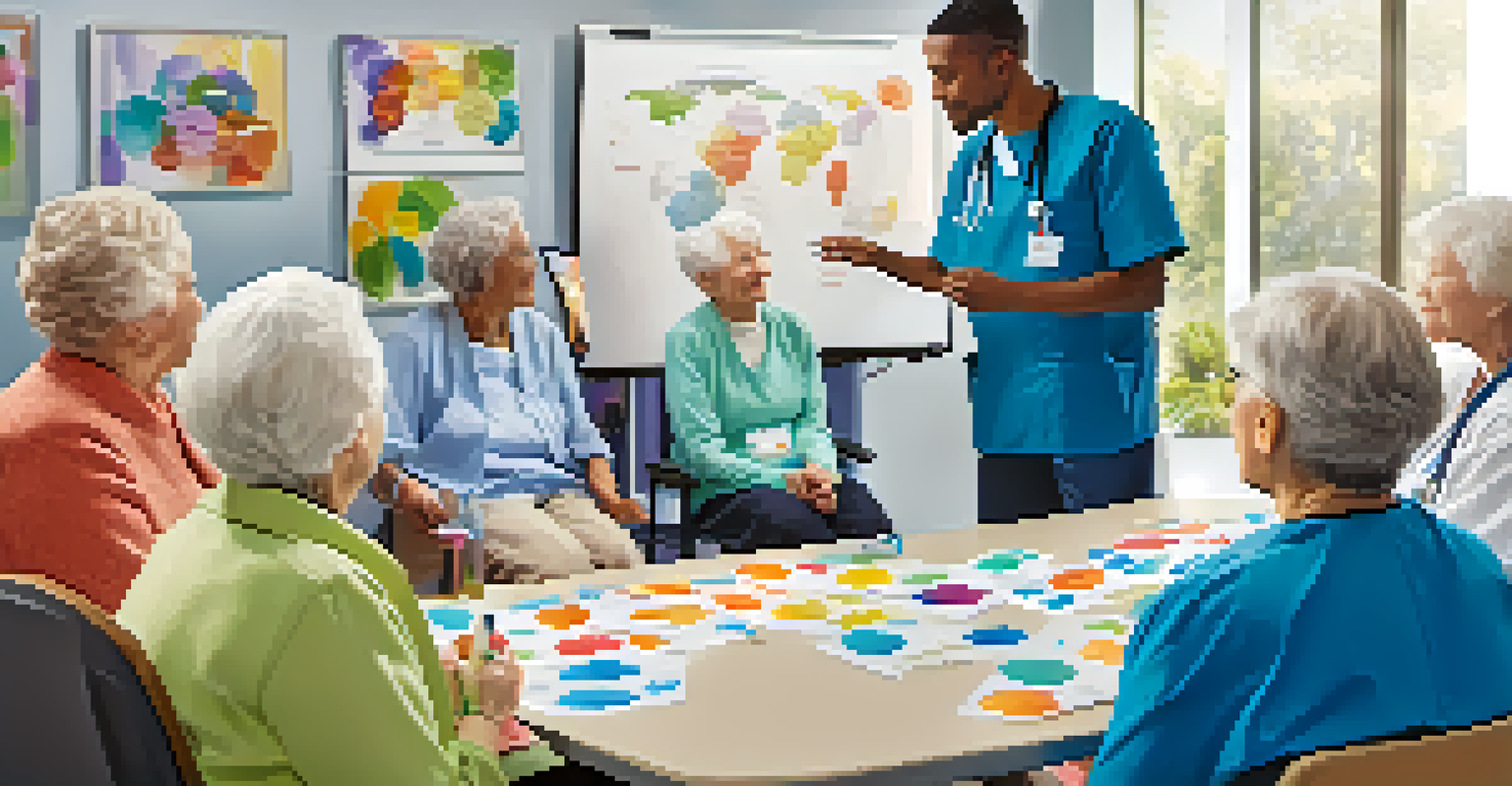Medication Management in Geriatrics: Best Practices

Understanding the Importance of Medication Management
Medication management in geriatrics is crucial due to age-related changes in the body. Older adults often have multiple health conditions that require various medications, making it essential to monitor their intake closely. Proper management helps prevent adverse drug reactions and interactions, which can significantly impact their health and quality of life.
Medication management is not just about the medicines themselves; it's about the relationships we build to ensure patients get the best outcomes.
Moreover, many older adults may experience cognitive decline, making it harder for them to remember their medication schedules. This situation underscores the need for caregivers and healthcare providers to implement effective medication management strategies. By doing so, we can enhance their adherence to prescribed regimens and ensure they receive the full benefits of their treatments.
Ultimately, a well-structured medication management plan can lead to improved health outcomes, fewer hospitalizations, and a better overall sense of well-being. It's more than just taking pills; it's about empowering older adults to maintain their health and independence.
Conducting Comprehensive Medication Reviews
A comprehensive medication review is a cornerstone of effective medication management. This review involves evaluating all current medications, including prescriptions, over-the-counter drugs, and supplements. By identifying unnecessary medications and potential interactions, healthcare providers can tailor treatment plans to suit the individual needs of older adults.

These reviews should be conducted regularly, especially after any changes in health status or when new medications are prescribed. Engaging older adults in this process can also promote their understanding and involvement in their own healthcare decisions. This collaborative approach enhances the relationship between patients and providers, fostering trust and open communication.
Importance of Medication Management
Effective medication management is vital for older adults to prevent adverse reactions and enhance their health and independence.
Involving pharmacists in medication reviews can further enhance safety and efficacy. Their expertise allows for the identification of potential issues that may not be apparent to other healthcare professionals, ensuring that older adults receive the best possible care.
Simplifying Medication Regimens for Better Adherence
Simplifying medication regimens is a vital strategy for enhancing adherence among older adults. Complex schedules with multiple doses throughout the day can be overwhelming and lead to missed doses. By consolidating medications when possible or using combination pills, healthcare providers can make it easier for patients to follow their regimens.
The greatest medicine of all is to teach people how not to need it.
Using pill organizers or medication management apps can also significantly improve adherence. These tools help patients keep track of their medications and remind them when it's time to take them. It's like having a personal assistant in their pocket, making medication management feel less daunting.
Another effective strategy is the use of once-daily dosing whenever appropriate. This approach minimizes the number of times a patient must think about their medications throughout the day, ultimately leading to better compliance and health outcomes.
Educating Patients and Caregivers on Medication Use
Education is a powerful tool in medication management for older adults. Providing clear, understandable information about each medication, including its purpose and potential side effects, can empower patients and their caregivers. When individuals understand their medications, they are more likely to adhere to prescribed regimens and communicate any concerns with their healthcare providers.
Utilizing teach-back methods can be particularly effective in ensuring comprehension. This involves asking patients to repeat the information back to the provider to confirm understanding. This interactive approach encourages questions and discussions, creating a more engaging learning environment.
Role of Technology in Management
Utilizing technology like apps and telehealth can significantly improve medication adherence and communication between patients and providers.
Additionally, providing printed materials or resources in multiple formats—such as videos or infographics—can cater to different learning styles. This way, both patients and caregivers can feel confident in managing medications effectively.
Monitoring for Side Effects and Drug Interactions
Monitoring for side effects and potential drug interactions is essential in geriatrics. Older adults are often more susceptible to side effects due to physiological changes that occur with aging. Regular check-ins with healthcare providers can help identify and address these issues before they escalate into serious problems.
To facilitate this monitoring, keeping a detailed medication list is crucial. This list should include all current medications, dosages, and any adverse effects experienced. Sharing this information during medical appointments allows healthcare providers to make informed decisions about adjusting medications or dosages.
Encouraging open communication between patients, caregivers, and healthcare teams also plays a vital role in monitoring. Establishing a culture where patients feel comfortable reporting side effects can lead to quicker interventions and better overall health management.
Utilizing Technology for Medication Management
Technology can significantly enhance medication management for older adults. From mobile apps that send reminders to smart pill dispensers that organize medications, these tools make it easier to keep track of complex regimens. By integrating technology into daily routines, older adults can feel more in control of their medication schedules.
Telehealth services also offer convenient ways for patients to consult with healthcare providers without the need for physical appointments. This accessibility can be especially beneficial for those with mobility issues or those living in remote areas. Regular virtual check-ins allow for ongoing medication management and support, ensuring that patients receive timely assistance.
Collaboration for Better Outcomes
A multidisciplinary approach involving various healthcare providers ensures comprehensive care and better health outcomes for older adults.
Moreover, technology can facilitate better communication among healthcare teams. Electronic health records can be shared seamlessly, allowing providers to stay informed about patients’ medication lists, allergies, and health conditions, ultimately leading to safer prescribing practices.
Collaborating with Healthcare Providers for Optimal Outcomes
Collaboration among healthcare providers is key to successful medication management in geriatrics. A multidisciplinary approach, involving doctors, pharmacists, nurses, and other professionals, ensures that all aspects of a patient's health are considered. This teamwork helps to create a comprehensive care plan that addresses both medical and lifestyle factors affecting medication adherence.
Regular team meetings can facilitate discussions about individual patients, allowing providers to share insights and strategies. This collaborative environment fosters a culture of continuous improvement in patient care, ultimately enhancing health outcomes for older adults.

Involving patients and their families in this collaborative process can further strengthen the care provided. When patients feel included in their care team, they are more likely to engage with their treatment plans and communicate openly about their needs and concerns.